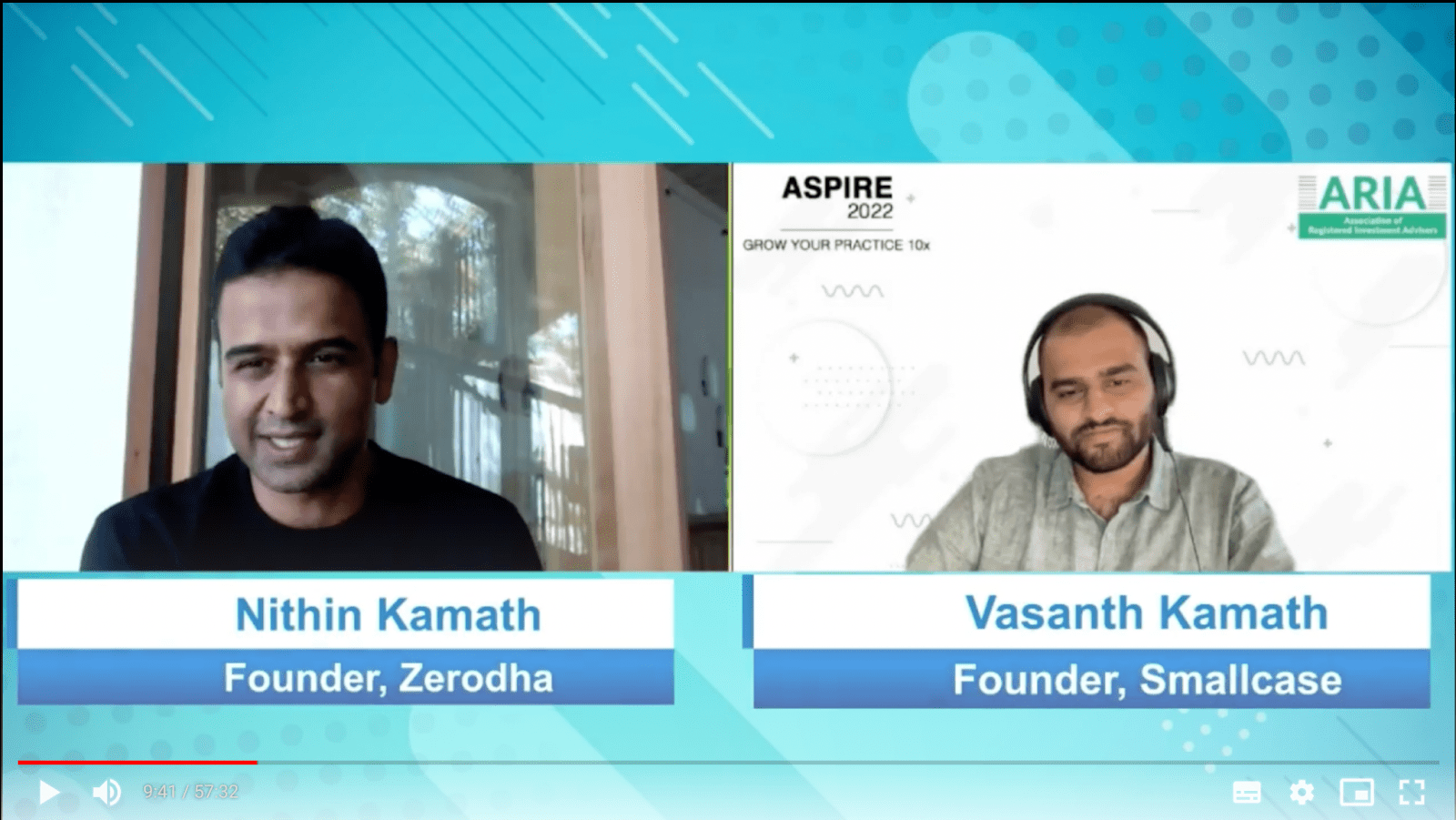Fintech Forward: Vasanth Kamath in conversation with Nithin Kamath

Just yesterday we did 15 million orders in a day, it’s unheard of. And we were doing 2-2.5 million orders a day 2 years ago. This is more than what happens all over the US in a day!
Nithin Kamath
Earlier this year, the Association of Registered Investment Advisers (ARIA) hosted ASPIRE 2022, a virtual summit for fund managers and investment advisors with expert views and insights around business planning, prospecting, client management, fast-moving technology trends and much more.
Of the many interesting sessions at the event, an exciting session titled ‘Kamath vs. Kamath: A fireside chat on the future of Fintech’ was organised with Nithin Kamath – Founder, Zerodha and Rainmatter and Vasanth Kamath – Founder, smallcase where they discussed what it takes to build and scale a business and what’s next in fintech.
Challenges building Zerodha
Vasanth began by asking Nithin about the challenges in the 0-1 phase vs the 1-100 phase of building Zerodha and the learnings in both. Nithin doesn’t believe that Zerodha was an overnight success as many think but that he got lucky and met the right people to build the business with. Nithin attributes the success to his partners and years of learning about various stakeholders. His first challenge was to come to terms with the idea of starting a brokerage firm without any real experience in the stock market except for being a trader himself. He wanted to build a company for active traders and set himself a target of 100k users but never imagined it would grow to the scale that it has today.
He also believes the fact that technology came for free, given his lack of a tech background, helped him get started. When NSE started a free trading platform, Zerodha was among the first to try it and spot an opportunity to disrupt pricing.
Looking back, starting in 2010, which was the worst year for the broking industry, was probably the best thing that happened to the business because, for the first three years, the company had no competition as everyone was moving away from broking, while we got into it.
The focus of the first three years was on building trust as a business because when it comes to money, gaining credibility is very tough. Three years later, Zerodha’s first competitor came around and they found that they weren’t doing anything unique anymore. “I realised we needed a moat to continue to build the business. I got lucky to meet Kailash (Nadh, CTO, Zerodha) at this time and he’s the reason we could go from being a brokerage firm to a fintech firm.”
After 2013, the challenges were different. They had to build a better product. They launched the app and built Kite and the ecosystem around it. In 2017, Zerodha started to scale. Aadhar enabled online account opening and that got 5-10k new customers a month on to the platform. So from 2017 it was about making products work with scale. So the challenges have been different at different points.
Zerodha now is at the point where they want the markets to grow. They believe they are big fish in a small pond now. India has 1 Cr investors but not comparable to the population of the country so the ecosystem needs to find ways to expand the market according to Nithin. This will mean competition should grow, new products, platforms and new users coming into the markets.
Zerodha’s team structure has been one of the key reasons for its success
Nithin used to be of the opinion that throwing money at people and problems would be solved. He soon realised he was wrong. Great teams aren’t built overnight and keeping their attrition very low has been oen of the reasons for their success. The reason for this is that teams are sold on the company vision.
Our vision is to get Indians away from fixed assets into assets that benefit the economy like the stock market and entrepreneurs.
The company doesn’t have a hierarchy, each one is an owner of the product. When people can build with impact, teams are motivated. There is no pressure in the business, no targets or revenue goals, no post 6 pm and weekend chats. “There are many ways to build a business and we have taken a route where we enjoy ourselves in the process.”
Vasanth commented on how smallcase attracts and retains talent, he says that since the founders and initial team worked so closely with Nithin in the first three years of the company’s incorporation, a lot of smallcase’s framework is similar to Zerodha’s.
We have been lucky that a lot of those who joined us were users of smallcase themselves. Our focus remains on delivering the best experience and continuously innovating thanks to this.
The founders’ job is to think of employees’ wealth creation so that teams can focus on and enjoy building. The day a company starts to compromise on our product principles, they will see retention and attrition problems.
How can regulation and innovation go together?
Nithin views this as a strong possibility. He believes in building whatever is in the best interest of the user and SEBI has been onboard with it as long as it doesn’t harm the customer. SEBI is one of the best regulators in the world and the safest for retail investors in his opinion. “The capital markets structure that they have created is brilliant.” SEBI is open to new startups who work within their regulations, their advisory services and sandbox help to understand what can work and what can’t.
Nithin’s personal finances
He has entrusted his brother and co-founder Nikhil Kamath with money management. The only investment he makes is through Rainmatter Foundation, Zerodha’s philanthropic initiative focused on funding and incubating fintech startups.
“We are invested in India and Indian listed companies.“
Outside of this, he has invested in private Indian companies only through Rainmatter. He is also bullish on gold in the long term and expects volatility.
Managing and popularising risk
Nithin says he doesn’t do anything without knowing all the outcomes when making decisions. Most investors think of returns when they should consider risks he feels. The idea behind always talking about risk, is to have more people think about it because it’s the only thing in one’s control and to manage it effectively. And that’s how he thinks when he invests in startups too. He assumes it will go down to 0 and that’s what he makes peace with right at the start.
Trading in the stock markets is the most stressful way to make money! And building a brokerage firm on top of that, it’s just a lot of volatility to deal with.
Over the last two yeats, he has started talking about things more openly because when he felt the business was successful and he knows people would listen to him. He feels someone has to go out there and talk about risk.
You can’t go too wrong when you err on the side of caution and consider risk.
Role of the financial advisor
In today’s age of DIY investment management, Nithin often wonders about whether Zerodha is truly making a positive difference in the lives of retail investors in India. He personally doesn’t think so! People need advisors to tell them what to do with their money. Else they look to social media which is dangerous according to Nithin. He wants more advisors to come into the market.
Platforms like ours can exist and do well if advisors point them in the right direction, especially when financial education in India is so underpenetrated.
There are a few challenges for advisors in his mind that need to be solved:
- Access to technology to set up and scale
- Customer acquisition costs are very high
Nithin was planning to come up with a solution to this but sees the smallcase Publisher platform as serving this need perfectly.
The future of advisory is the human layer. Tech can’t replace it but it can augment it.
Vasanth Kamath
He adds that to disrupt advisory the way it is today, you need a regulatory shift, consumer mindset shift, tech solutions and market cycles to all propel this.
Publisher aims to give advisors everything they need to start their business while advisors maintain relationships with clients and allocate resources. smallcase hopes taking away all these overheads will help accelerate the phenomenon further and encourage advisors to enter the ecosystem.
Zerodha AMC coming soon
It’s about time the passive came to the centre stage.
Finally, about the excitement of the soon to be launched Zerodha AMC, Nithin says he wants the way mutual funds are sold to be simplified.
When attention spans have reduced, call them advanced or hybrid funds and people tend to drop off. We have to map them to people’s goals. I think there is a way to use technology to optimise on operational costs of traditional AMCs. There is conflict when AMCs show both active and passive products, it’s high time there is a passive-first AMC in India.
You can watch the full conversation here.





